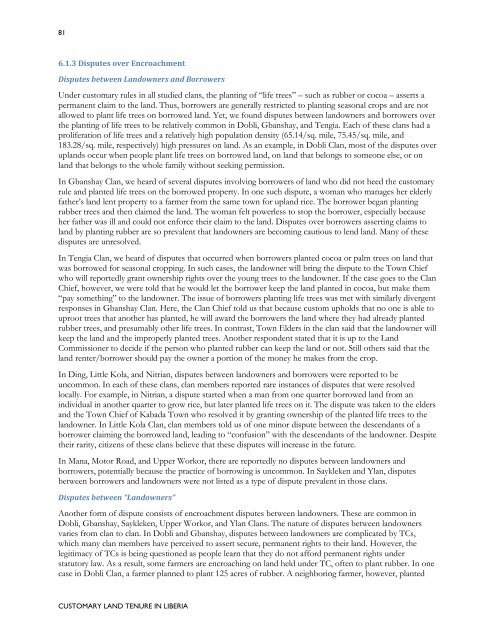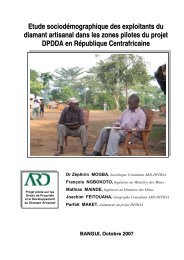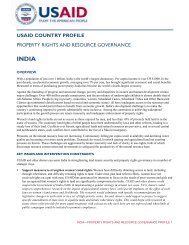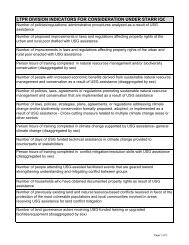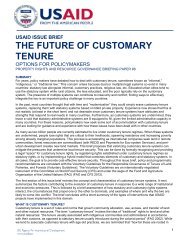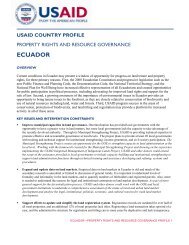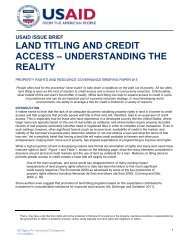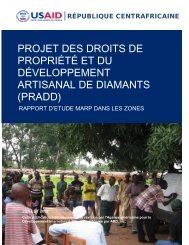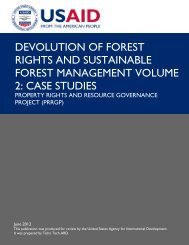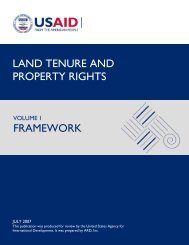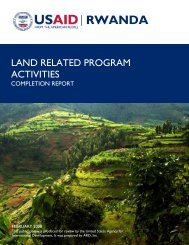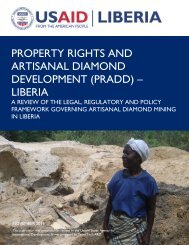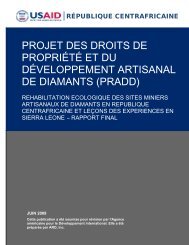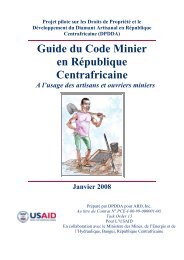Customary Land Tenure in Liberia - Land Tenure and Property ...
Customary Land Tenure in Liberia - Land Tenure and Property ...
Customary Land Tenure in Liberia - Land Tenure and Property ...
You also want an ePaper? Increase the reach of your titles
YUMPU automatically turns print PDFs into web optimized ePapers that Google loves.
81<br />
6.1.3 Disputes over Encroachment<br />
Disputes between <strong>L<strong>and</strong></strong>owners <strong>and</strong> Borrowers<br />
Under customary rules <strong>in</strong> all studied clans, the plant<strong>in</strong>g of “life trees” – such as rubber or cocoa – asserts a<br />
permanent claim to the l<strong>and</strong>. Thus, borrowers are generally restricted to plant<strong>in</strong>g seasonal crops <strong>and</strong> are not<br />
allowed to plant life trees on borrowed l<strong>and</strong>. Yet, we found disputes between l<strong>and</strong>owners <strong>and</strong> borrowers over<br />
the plant<strong>in</strong>g of life trees to be relatively common <strong>in</strong> Dobli, Gbanshay, <strong>and</strong> Tengia. Each of these clans had a<br />
proliferation of life trees <strong>and</strong> a relatively high population density (65.14/sq. mile, 75.45/sq. mile, <strong>and</strong><br />
183.28/sq. mile, respectively) high pressures on l<strong>and</strong>. As an example, <strong>in</strong> Dobli Clan, most of the disputes over<br />
upl<strong>and</strong>s occur when people plant life trees on borrowed l<strong>and</strong>, on l<strong>and</strong> that belongs to someone else, or on<br />
l<strong>and</strong> that belongs to the whole family without seek<strong>in</strong>g permission.<br />
In Gbanshay Clan, we heard of several disputes <strong>in</strong>volv<strong>in</strong>g borrowers of l<strong>and</strong> who did not heed the customary<br />
rule <strong>and</strong> planted life trees on the borrowed property. In one such dispute, a woman who manages her elderly<br />
father‟s l<strong>and</strong> lent property to a farmer from the same town for upl<strong>and</strong> rice. The borrower began plant<strong>in</strong>g<br />
rubber trees <strong>and</strong> then claimed the l<strong>and</strong>. The woman felt powerless to stop the borrower, especially because<br />
her father was ill <strong>and</strong> could not enforce their claim to the l<strong>and</strong>. Disputes over borrowers assert<strong>in</strong>g claims to<br />
l<strong>and</strong> by plant<strong>in</strong>g rubber are so prevalent that l<strong>and</strong>owners are becom<strong>in</strong>g cautious to lend l<strong>and</strong>. Many of these<br />
disputes are unresolved.<br />
In Tengia Clan, we heard of disputes that occurred when borrowers planted cocoa or palm trees on l<strong>and</strong> that<br />
was borrowed for seasonal cropp<strong>in</strong>g. In such cases, the l<strong>and</strong>owner will br<strong>in</strong>g the dispute to the Town Chief<br />
who will reportedly grant ownership rights over the young trees to the l<strong>and</strong>owner. If the case goes to the Clan<br />
Chief, however, we were told that he would let the borrower keep the l<strong>and</strong> planted <strong>in</strong> cocoa, but make them<br />
“pay someth<strong>in</strong>g” to the l<strong>and</strong>owner. The issue of borrowers plant<strong>in</strong>g life trees was met with similarly divergent<br />
responses <strong>in</strong> Gbanshay Clan. Here, the Clan Chief told us that because custom upholds that no one is able to<br />
uproot trees that another has planted, he will award the borrowers the l<strong>and</strong> where they had already planted<br />
rubber trees, <strong>and</strong> presumably other life trees. In contrast, Town Elders <strong>in</strong> the clan said that the l<strong>and</strong>owner will<br />
keep the l<strong>and</strong> <strong>and</strong> the improperly planted trees. Another respondent stated that it is up to the <strong>L<strong>and</strong></strong><br />
Commissioner to decide if the person who planted rubber can keep the l<strong>and</strong> or not. Still others said that the<br />
l<strong>and</strong> renter/borrower should pay the owner a portion of the money he makes from the crop.<br />
In D<strong>in</strong>g, Little Kola, <strong>and</strong> Nitrian, disputes between l<strong>and</strong>owners <strong>and</strong> borrowers were reported to be<br />
uncommon. In each of these clans, clan members reported rare <strong>in</strong>stances of disputes that were resolved<br />
locally. For example, <strong>in</strong> Nitrian, a dispute started when a man from one quarter borrowed l<strong>and</strong> from an<br />
<strong>in</strong>dividual <strong>in</strong> another quarter to grow rice, but later planted life trees on it. The dispute was taken to the elders<br />
<strong>and</strong> the Town Chief of Kabada Town who resolved it by grant<strong>in</strong>g ownership of the planted life trees to the<br />
l<strong>and</strong>owner. In Little Kola Clan, clan members told us of one m<strong>in</strong>or dispute between the descendants of a<br />
borrower claim<strong>in</strong>g the borrowed l<strong>and</strong>, lead<strong>in</strong>g to “confusion” with the descendants of the l<strong>and</strong>owner. Despite<br />
their rarity, citizens of these clans believe that these disputes will <strong>in</strong>crease <strong>in</strong> the future.<br />
In Mana, Motor Road, <strong>and</strong> Upper Workor, there are reportedly no disputes between l<strong>and</strong>owners <strong>and</strong><br />
borrowers, potentially because the practice of borrow<strong>in</strong>g is uncommon. In Saykleken <strong>and</strong> Ylan, disputes<br />
between borrowers <strong>and</strong> l<strong>and</strong>owners were not listed as a type of dispute prevalent <strong>in</strong> those clans.<br />
Disputes between “<strong>L<strong>and</strong></strong>owners”<br />
Another form of dispute consists of encroachment disputes between l<strong>and</strong>owners. These are common <strong>in</strong><br />
Dobli, Gbanshay, Saykleken, Upper Workor, <strong>and</strong> Ylan Clans. The nature of disputes between l<strong>and</strong>owners<br />
varies from clan to clan. In Dobli <strong>and</strong> Gbanshay, disputes between l<strong>and</strong>owners are complicated by TCs,<br />
which many clan members have perceived to assert secure, permanent rights to their l<strong>and</strong>. However, the<br />
legitimacy of TCs is be<strong>in</strong>g questioned as people learn that they do not afford permanent rights under<br />
statutory law. As a result, some farmers are encroach<strong>in</strong>g on l<strong>and</strong> held under TC, often to plant rubber. In one<br />
case <strong>in</strong> Dobli Clan, a farmer planned to plant 125 acres of rubber. A neighbor<strong>in</strong>g farmer, however, planted<br />
CUSTOMARY LAND TENURE IN LIBERIA


